Memoir of John Shakespear Bartley, 1916-1919 - Part 14
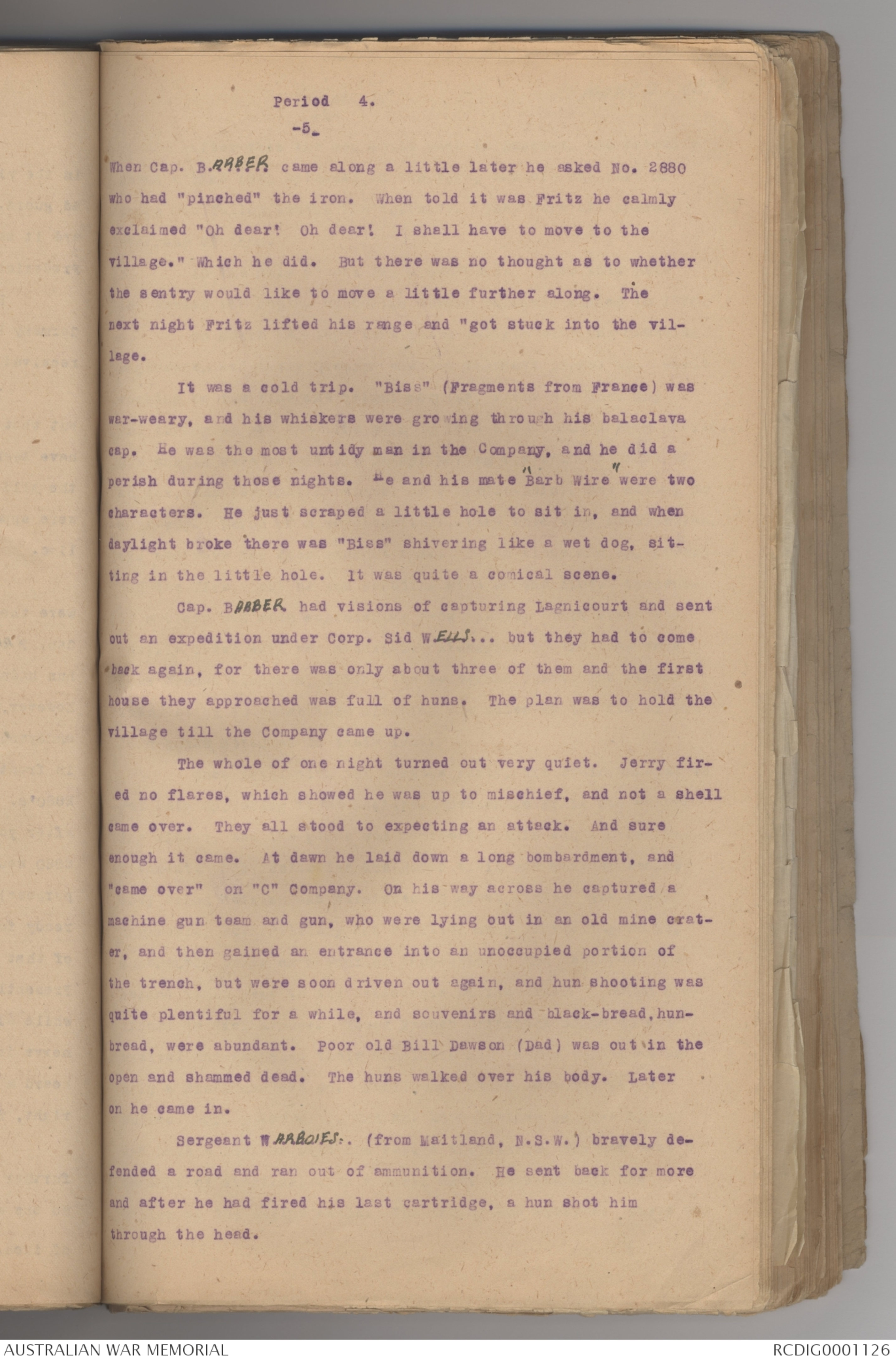
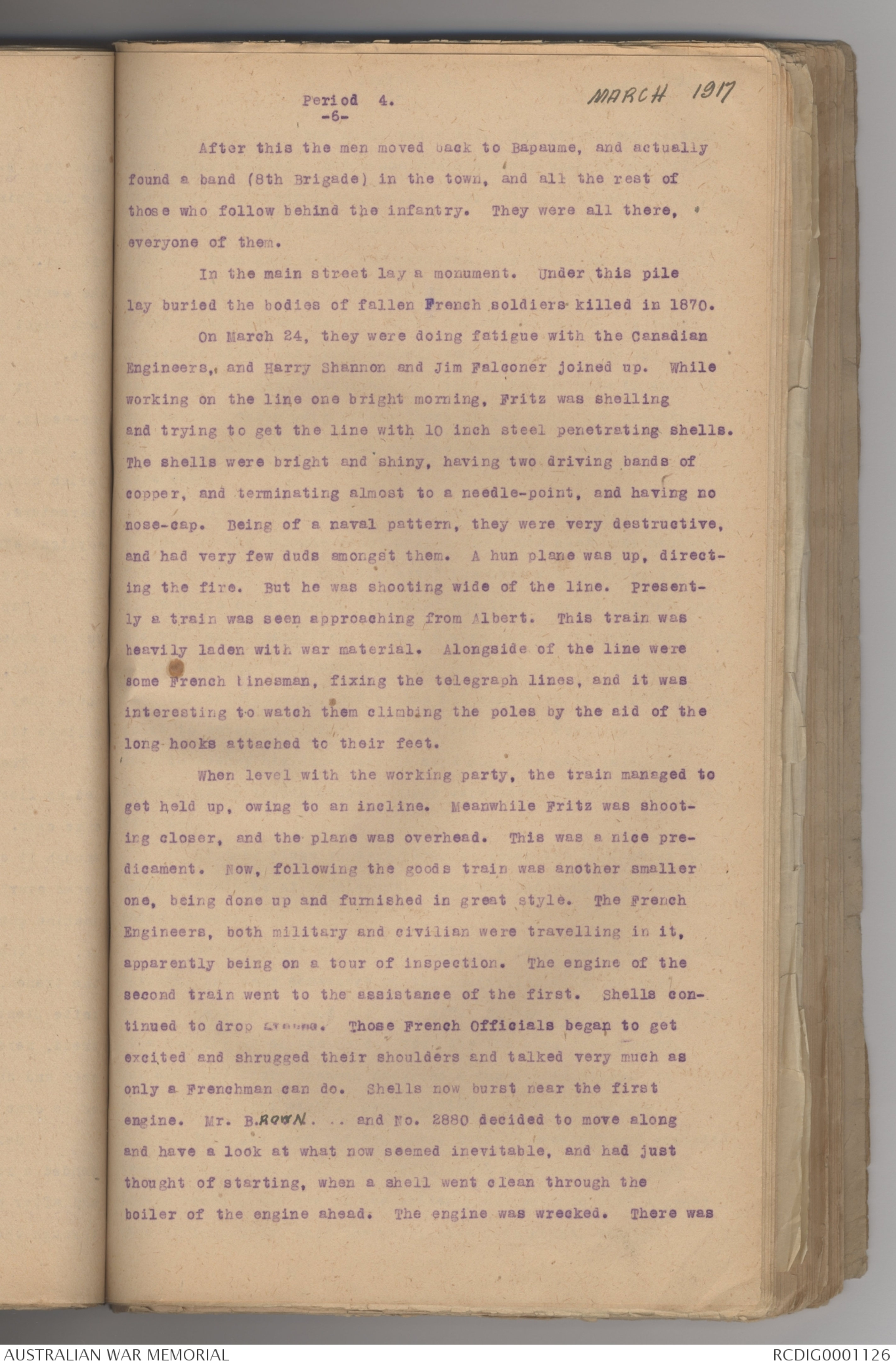
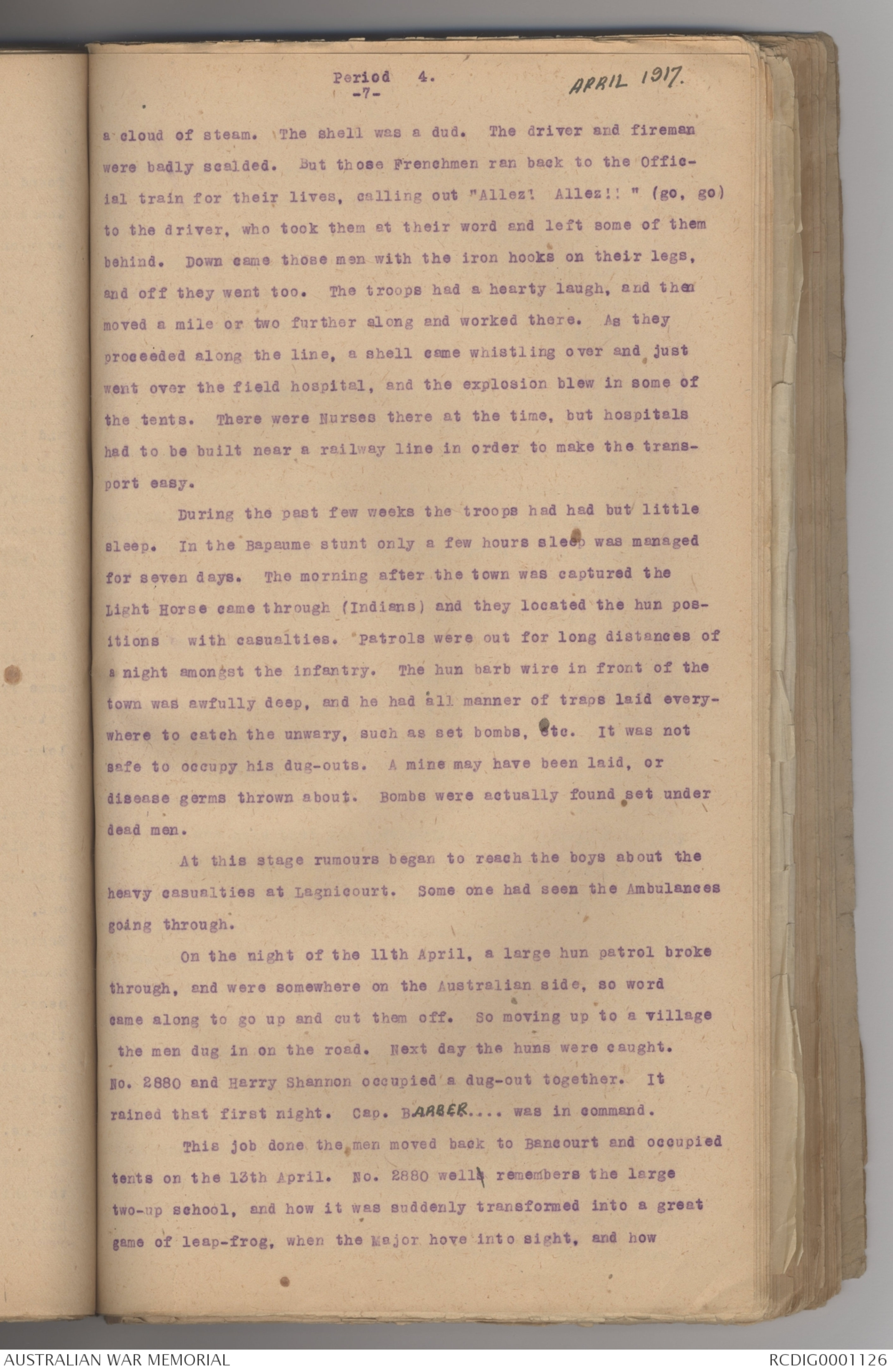
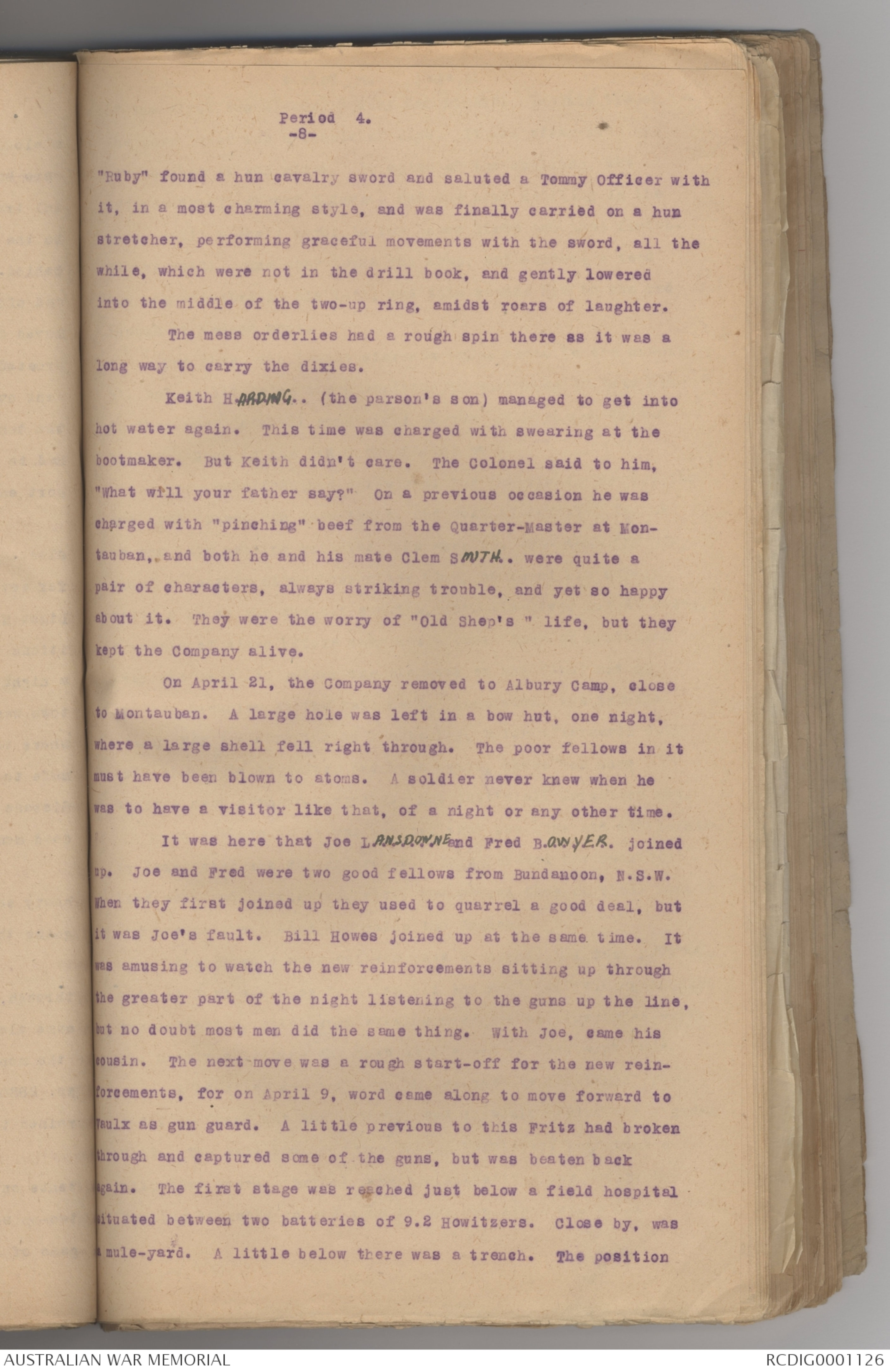
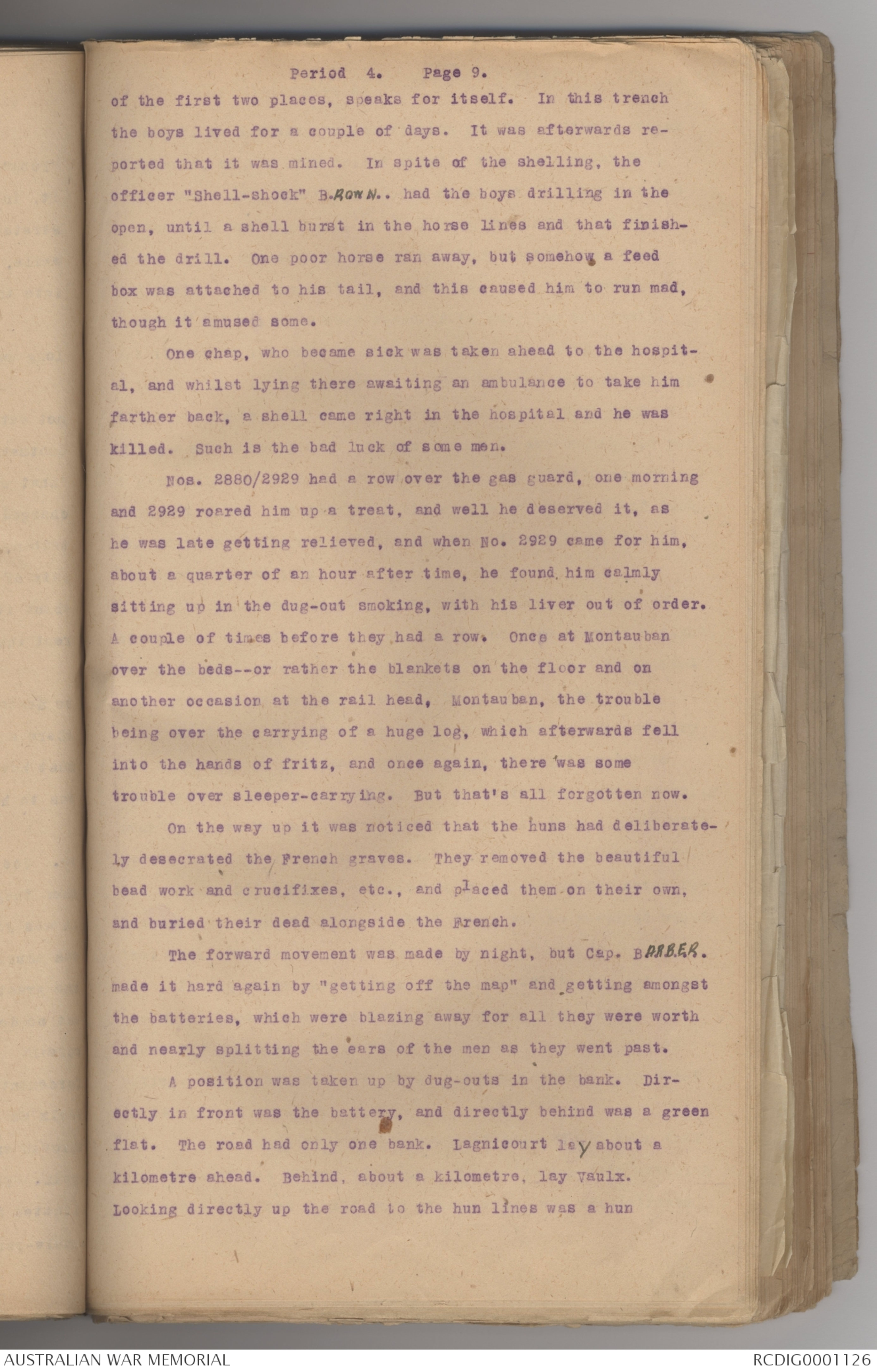
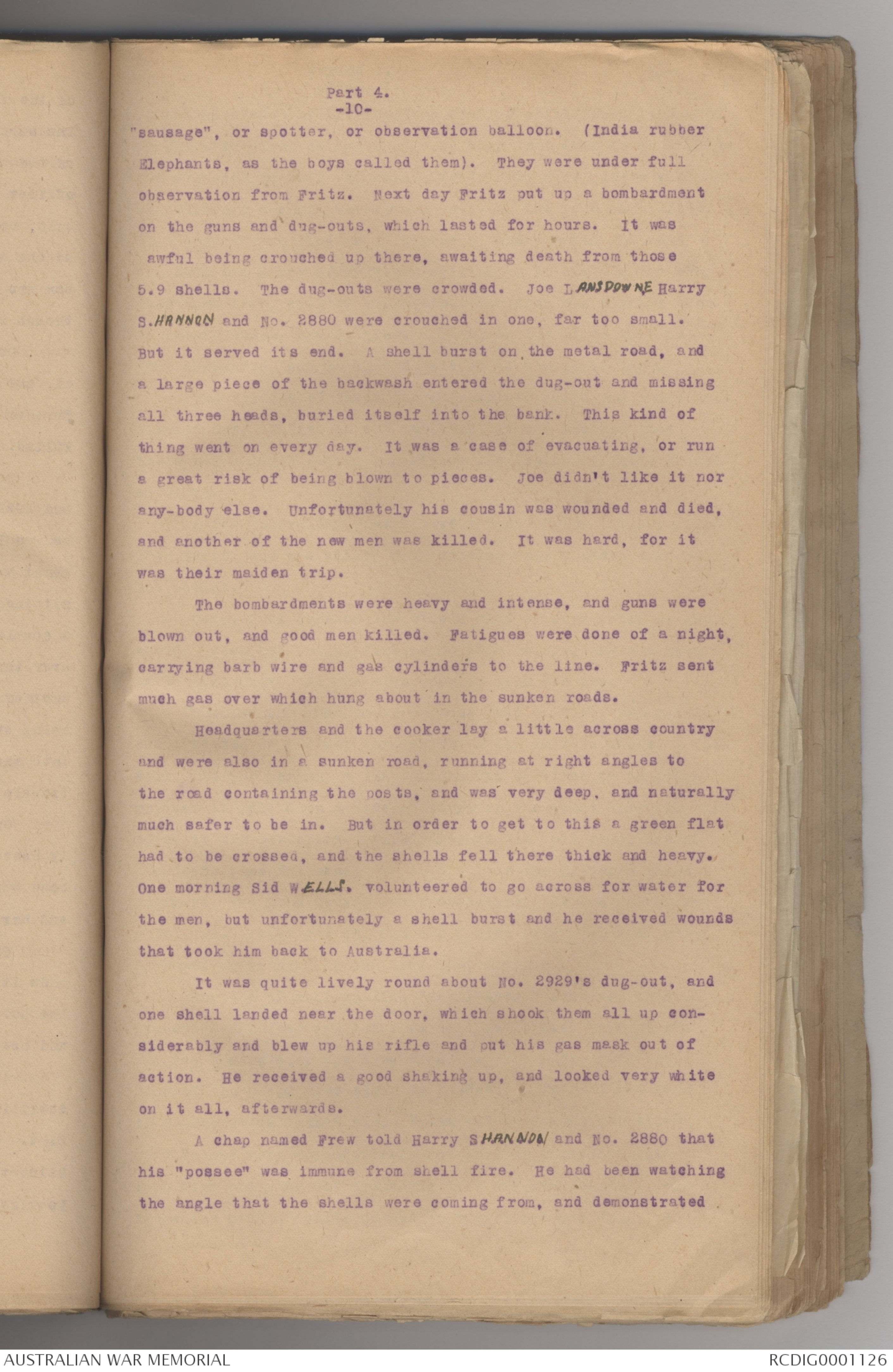
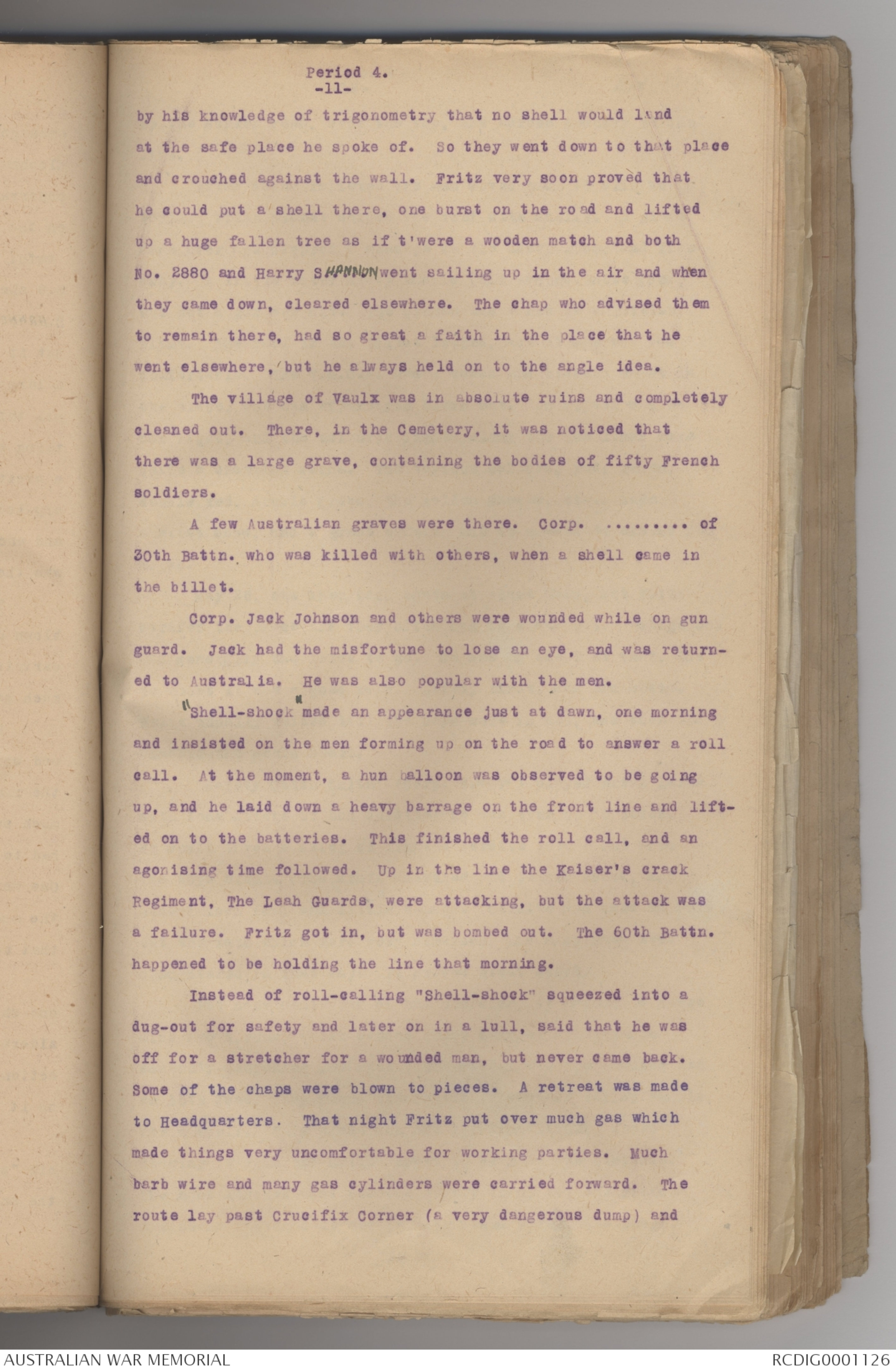
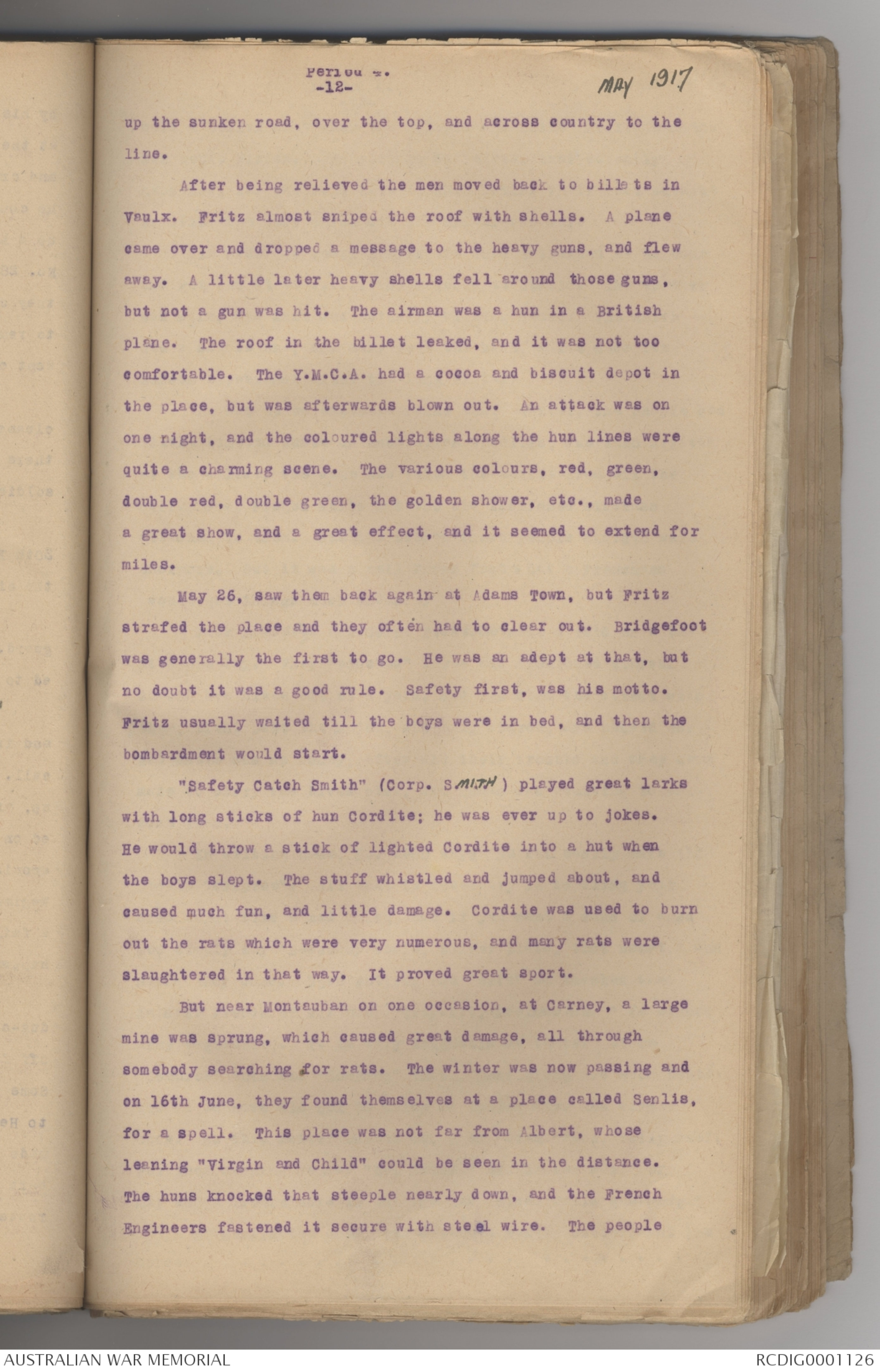
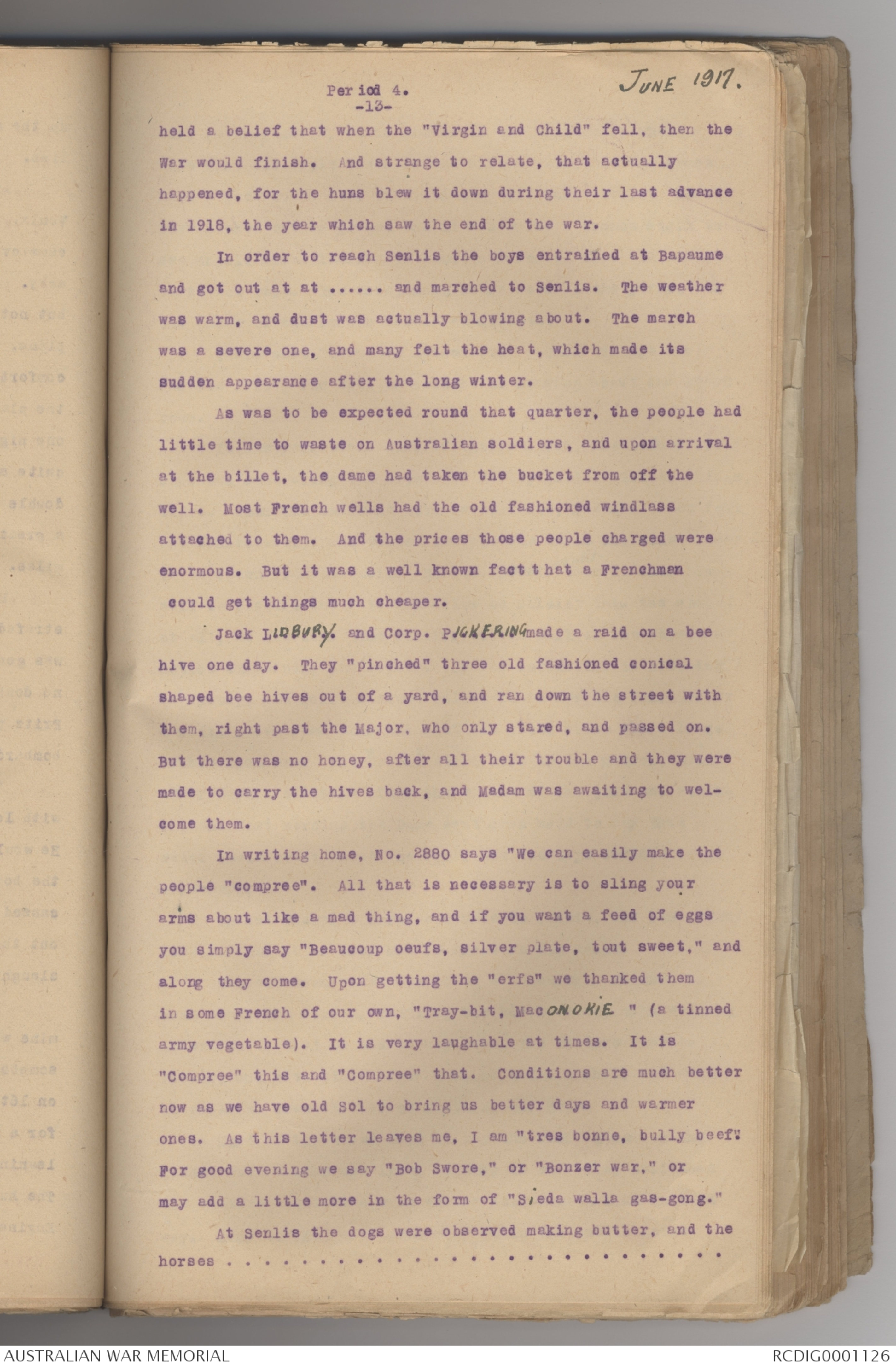
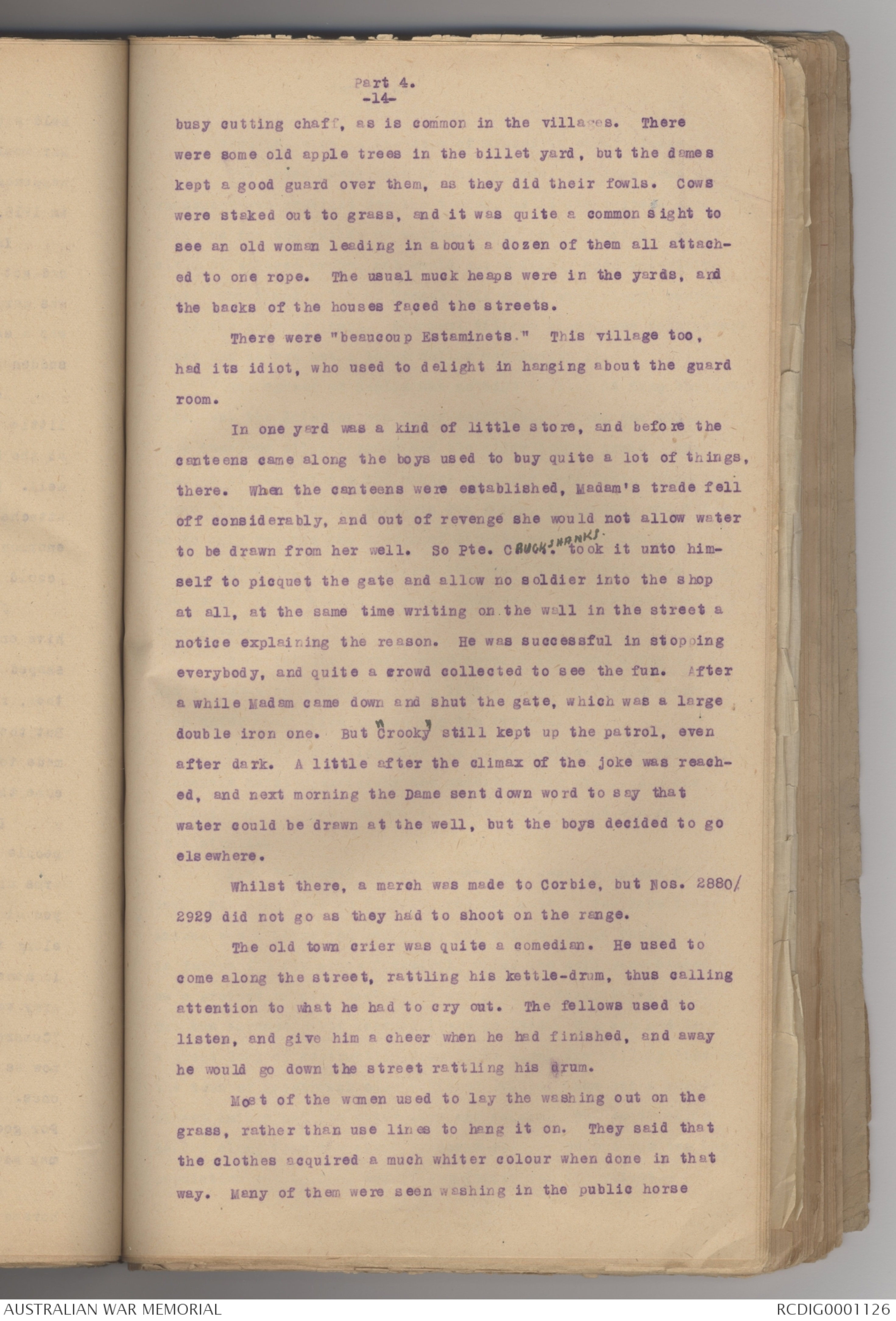
Period 4.
-5_
When Cap. BARBER came along a little later he asked No. 2880
who had "pinched" the iron. When told it was Fritz he calmly
exclaimed "Oh dear! Oh dear! I shall have to move to the
village." Which he did. But there was no thought as to whether
the sentry would like to move a little further along. The
next night Fritz lifted his range and "got stuck into the village.
It was a cold trip. "Biss" (Fragments from France) was
war-weary, and his whiskers were growing through his balaclava
cap. He was the most untidy man in the Company, and he did a
perish during those nights. He and his mate "Barb Wire" were two
characters. He just scraped a little hole to sit in, and when
daylight broke there was "Biss" shivering like a wet dog, sitting
in the little hole. It was quite a comical scene.
Cap. BARBER had visions of capturing Lagnicourt and sent
out an expedition under Corp. Sid Wells but they had to come
back again, for there was only about three of them and the first
house they approached was full of huns. The plan was to hold the
village till the Company came up.
The whole of one night turned out very quiet. Jerry fired
no flares, which showed he was up to mischief, and not a shell
came over. They all stood to expecting an attack. And sure
enough it came. At dawn he laid down a long bombardment, and
"came over" on "C" Company. On his way across he captured a
machine gun team and gun, who were lying out in an old mine crater,
and then gained an entrance into an unoccupied portion of
the trench, but were soon driven out again, and hun shooting was
quite plentiful for a while, and souvenirs and black-bread, hun-
bread, were abundant. Poor old Bill Dawson (Dad) was out in the
open and shammed dead. The huns walked over his body. Later
on he came in.
Sergeant WARBOIES. (from Maitland, N.S.W.) bravely defended
a road and ran out of ammunition. He sent back for more
and after he had fired his last cartridge, a hun shot him
through the head.
MARCH 1917
Period 4.
-6-
After this the men moved back to Bapaume, and actually
found a band (8th Brigade) in the town, and all the rest of
those who follow behind the infantry. They were all there,
everyone of them.
In the main street lay a monument. Under this pile
lay buried the bodies of fallen French soldiers killed in 1870.
On March 24, they were doing fatigue with the Canadian
Engineers, and Harry Shannon and Jim Falconer joined up. While
working on the line one bright morning, Fritz was shelling
and trying to get the line with 10 inch steel penetrating shells.
The shells were bright and shiny, having two driving bands of
copper, and terminating almost to a needle-point, and having no
nose-cap. Being of a naval pattern, they were very destructive,
and had very few duds amongst them. A hun plane was up, directing
the fire. But he was shooting wide of the line. Presently
a train was seen approaching from Albert. This train was
heavily laden with war material. Alongside of the line were
some French linesman, fixing the telegraph lines, and it was
interesting to watch them climbing the poles by the aid of the
long hooks attached to their feet.
When level with the working party, the train managed to
get held up. owing to an incline. Meanwhile Fritz was shooting
closer, and the plane was overhead. This was a nice predicament.
Now, following the goods train was another smaller
one, being done up and furnished in great style. The French
Engineers, both military and civilian were travelling in it,
apparently being on a tour of inspection. The engine of the
second train went to the assistance of the first. Shells continued
to drop around. Those French Officials began to get
excited and shrugged their shoulders and talked very much as
only a Frenchman can do. Shells now burst near the first
engine. Mr. BROWN and No. 2880 decided to move along
and have a look at what now seemed inevitable, and had just
thought of starting, when a shell went clean through the
boiler of the engine ahead. The engine was wrecked. There was
APRIL 1917.
Period 4.
-7-
a cloud of steam. The shell was a dud. The driver and fireman
were badly scalded. But those Frenchmen ran back to the Official
train for their lives, calling out "Allez! Allez!!" (go, go)
to the driver, who took them at their word and left some of them
behind. Down came those men with the iron hooks on their legs,
and off they went too. The troops had a hearty laugh, and then
moved a mile or two further along and worked there. As they
proceeded along the line, a shell came whistling over and just
went over the field hospital, and the explosion blew in some of
the tents. There were Nurses there at the time, but hospitals
had to be built near a railway line in order to make the transport
easy.
During the past few weeks the troops had had but little
sleep. In the Bapaume stunt only a few hours sleep was managed
for seven days. The morning after the town was captured the
Light Horse came through (Indians) and they located the hun positions
with casualties. Patrols were out for long distances of
a night amongst the infantry. The hun barb wire in front of the
town was awfully deep, and he had all manner of traps laid everywhere
to catch the unwary, such as set bombs, etc. It was not
safe to occupy his dug-outs. A mine may have been laid, or
disease germs thrown about. Bombs were actually found set under
dead men.
At this stage rumours began to reach the boys about the
heavy casualties at Lagnicourt. Some one had seen the Ambulances
going through.
On the night of the 11th April, a large hun patrol broke
through, and were somewhere on the Australian side, so word
came along to go up and cut them off. So moving up to a village
the men dug in on the road. Next day the huns were caught.
No. 2880 and Harry Shannon occupied a dug-out together. It
rained that first night. Cap. BARBER was in command.
This job done the men moved back to Bancourt and occupied
tents on the 13th April. No. 2880 wells remembers the large
two-up school, and how it was suddenly transformed into a great
game of leap-frog, when the Major hove into sight, and how
Period 4.
-8-
"Ruby' found a hun cavalry sword and saluted a Tommy Officer with
it, in a most charming style, and was finally carried on a hun
stretcher, performing graceful movements with the sword, all the
while, which were not in the drill book, and gently lowered
into the middle of the two-up ring, amidst roars of laughter.
The mess orderlies had a rough spin there as it was a
long way to carry the dixies.
Keith HARDING (the parson's son) managed to get into
hot water again. This time was charged with swearing at the
bootmaker. But Keith didn't care. The Colonel said to him,
"What will your father say?" On a previous occasion he was
charged with "pinching" beef from the Quarter-Master at Montauban,
and both he and his mate Clem SOUTH were quite a
pair of characters, always striking trouble, and yet so happy
about it. They were the worry of "Old Shep's " life, but they
kept the Company alive.
On April 21, the Company removed to Albury Camp, close
to Montauban. A large hole was left in a bow hut, one night,
where a large shell fell right through. The poor fellows in it
must have been blown to atoms. A soldier never knew when he
was to have a visitor like that, of a night or any other time.
It was here that Joe LANSDOWNE and Fred BOWYER joined
up. Joe and Fred were two good fellows from Bundanoon, N.S.W.
When they first joined up they used to quarrel a good deal, but
it was Joe's fault. Bill Howes joined up at the same time. It
was amusing to watch the new reinforcements sitting up through
the greater part of the night listening to the guns up the line,
but no doubt most men did the same thing. With Joe, came his
cousin. The next move was a rough start-off for the new reinforcements,
for on April 9, word came along to move forward to
Vaulx as gun guard. A little previous to this Fritz had broken
through and captured some of the guns, but was beaten back
again. The first stage was reached just below a field hospital
situated between two batteries of 9.2 Howitzers. Close by, was
a mule-yard. A little below there was a trench. The position
Period 4. Page 9.
of the first two places, speaks for itself. In this trench
the boys lived for a couple of days. It was afterwards reported
that it was mined. In spite of the shelling, the
officer "Shell-shock" BROWN.. had the boys drilling in the
open, until a shell burst in the horse lines and that finished
the drill. One poor horse ran away, but somehow a feed
box was attached to his tail, and this caused him to run mad,
though it amused some.
One chap, who became sick was taken ahead to the hospital,
and whilst lying there awaiting an ambulance to take him
farther back, a shell came right in the hospital and he was
killed. Such is the bad luck of some men.
Nos. 2880/2929 had a row over the gas guard, one morning
and 2929 roared him up a treat, and well he deserved it, as
he was late getting relieved, and when No. 2929 came for him,
about a quarter of an hour after time, he found him calmly
sitting up in the dug-out smoking, with his liver out of order.
A couple of times before they had a row. Once at Montauban
over the beds--or rather the blankets on the floor and on
another occasion at the rail head, Montauban, the trouble
being over the carrying of a huge log, which afterwards fell
into the hands of fritz, and once again, there was some
trouble over sleeper-carrying. But that's all forgotten now.
On the way up it was noticed that the huns had deliberately
desecrated the French graves. They removed the beautiful
bead work and crucifixes, etc., and placed them on their own,
and buried their dead alongside the French.
The forward movement was made by night, but Cap. BARBER
made it hard again by "getting off the map" and getting amongst
the batteries, which were blazing away for all they were worth
and nearly splitting the ears of the men as they went past.
A position was taken up by dug-outs in the bank. Directly
in front was the battery, and directly behind was a green
flat. The road had only one bank. Lagnicourt lay about a
kilometre ahead. Behind, about a kilometre, lay Vaulx.
Looking directly up the road to the hun lines was a hun
Part 4.
-10-
"sausage", or spotter, or observation balloon. (India rubber
Elephants, as the boys called them). They were under full
observation from Fritz. Next day Fritz put up a bombardment
on the guns and dug-outs, which lasted for hours. It was
awful being crouched up there, awaiting death from those
5.9 shells. The dug-outs were crowded. Joe LANSDOWNE Harry
SHANNON and No. 2880 were crouched in one, far too small.
But it served its end. A shell burst on the metal road, and
a large piece of the backwash entered the dug-out and missing
all three heads, buried itself into the bank. This kind of
thing went on every day. It was a case of evacuating, or run
a great risk of being blown to pieces. Joe didn't like it nor
any-body else. Unfortunately his cousin was wounded and died,
and another of the new men was killed. It was hard, for it
was their maiden trip.
The bombardments were heavy and intense, and guns were
blown out, and good men killed. Fatigues were done of a night,
carrying barb wire and gas cylinders to the line. Fritz sent
much gas over which hung about in the sunken roads.
Headquarters and the cooker lay a little across country
and were also in a sunken road, running at right angles to
the road containing the posts, and was very deep, and naturally
much safer to be in. But in order to get to this a green flat
had to be crossed, and the shells fell there thick and heavy.
One morning Sid WELLS volunteered to go across for water for
the men, but unfortunately a shell burst and he received wounds
that took him back to Australia.
It was quite lively round about No. 2929's dug-out, and
one shell landed near the door, which shook them all up considerably
and blew up his rifle and put his gas mask out of
action. He received a good shaking up, and looked very white
on it all, afterwards.
A chap named Frew told Harry SHANNON and No. 2880 that
his "possee" was immune from shell fire. He had been watching
the angle that the shells were coming from, and demonstrated.
Period 4.
-11
by his knowledge of trigonometry that no shell would land
at the safe place he spoke of. So they went down to that place
and crouched against the wall. Fritz very soon proved that
he could put a shell there, one burst on the road and lifted
up a huge fallen tree as if t'were a wooden match and both
No. 2880 and Harry SHANNON went sailing up in the air and when
they came down, cleared elsewhere. The chap who advised them
to remain there, had so great a faith in the place that he
went elsewhere, but he always held on to the angle idea.
The village of Vaulx was in absolute ruins and completely
cleaned out. There, in the Cemetery, it was noticed that
there was a large grave, containing the bodies of fifty French
soldiers.
A few Australian graves were there. Corp. . . . . . . of
30th Battn, who was killed with others, when a shell came in
the billet.
Corp. Jack Johnson and others were wounded while on gun
guard. Jack had the misfortune to lose an eye, and was returned
to Australia. He was also popular with the men.
'Shell-shock" made an appearance just at dawn, one morning
and insisted on the men forming up on the road to answer a roll
call. At the moment, a hun balloon was observed to be going
up, and he laid down a heavy barrage on the front line and lifted
on to the batteries. This finished the roll call, and an
agonising time followed. Up in the line the Kaiser's crack
Regiment, The Leah Guards, were attacking, but the attack was
a failure. Fritz got in, but was bombed out. The 60th Battn.
happened to be holding the line that morning.
Instead of roll-calling "Shell-shock" squeezed into a
dug-out for safety and later on in a lull, said that he was
off for a stretcher for a wounded man, but never came back.
Some of the chaps were blown to pieces. A retreat was made
to Headquarters. That night Fritz put over much gas which
made things very uncomfortable for working parties. Much
barb wire and many gas cylinders were carried forward. The
route lay past Crucifix Corner (a very dangerous dump) and
MAY 1917
Period 4
-12-
up the sunken road, over the top, and across country to the
line.
After being relieved the men moved back to billets in
Vaulx. Fritz almost sniped the roof with shells. A plane
came over and dropped a message to the heavy guns, and flew
away. A little later heavy shells fell around those guns,
but not a gun was hit. The airman was a hun in a British
plane. The roof in the billet leaked, and it was not too
comfortable. The Y.M.C.A. had a cocoa and biscuit depot in
the place, but was afterwards blown out. An attack was on
one night, and the coloured lights along the hun lines were
quite a charming scene. The various colours, red, green,
double red, double green, the golden shower, etc., made
a great show, and a great effect, and it seemed to extend for
miles.
May 26, saw them back again at Adams Town, but Fritz
strafed the place and they often had to clear out. Bridgefoot
was generally the first to go. He was an adept at that, but
no doubt it was a good rule. Safety first, was his motto.
Fritz usually waited till the boys were in bed, and then the
bombardment would start.
"Safety Catch Smith" (Corp. SMITH) played great larks
with long sticks of hun Cordite; he was ever up to jokes.
He would throw a stick of lighted Cordite into a hut when
the boys slept. The stuff whistled and jumped about, and
caused much fun, and little damage. Cordite was used to burn
out the rats which were very numerous, and many rats were
slaughtered in that way. It proved great sport.
But near Montauban on one occasion, at Carney, a large
mine was sprung, which caused great damage, all through
somebody searching for rats. The winter was now passing and
on 16th June, they found themselves at a place called Senlis,
for a spell. This place was not far from Albert, whose
leaning "Virgin and Child" could be seen in the distance.
The huns knocked that steeple nearly down, and the French
Engineers fastened it secure with steel wire. The people
JUNE 1917.
Period 4.
-13-
held a belief that when the "Virgin and Child" fell, then the
War would finish. And strange to relate, that actually
happened, for the huns blew it down during their last advance
in 1918, the year which saw the end of the war.
In order to reach Senlis the boys entrained at Bapaume
and got out at at . . . . . and marched to Senlis. The weather
was warm, and dust was actually blowing about. The march
was a severe one, and many felt the heat, which made its
sudden appearance after the long winter.
As was to be expected round that quarter, the people had
little time to waste on Australian soldiers, and upon arrival
at the billet, the dame had taken the bucket from off the
well. Most French wells had the old fashioned windlass
attached to them. And the prices those people charged were
enormous. But it was a well known fact that a Frenchman
could get things much cheaper.
Jack LIDBURY and Corp. PICKERING made a raid on a bee
hive one day. They "pinched" three old fashioned conical
shaped bee hives out of a yard, and ran down the street with
them, right past the Major, who only stared, and passed on.
But there was no honey, after all their trouble and they were
made to carry the hives back, and Madam was awaiting to welcome
them.
In writing home, No. 2880 says "We can easily make the
people "compree". All that is necessary is to sling your
arms about like a mad thing, and if you want a feed of eggs
you simply say "Beaucoup oeufs, silver plate, tout sweet," and
along they come. Upon getting the "erfs" we thanked them
in some French of our own, "Tray-bit, maconokie" (a tinned
army vegetable). It is very laughable at times. It is
"Compree" this and "Compree" that. Conditions are much better
now as we have old Sol to bring us better days and warmer
ones. As this letter leaves me, I am "tres bonne, bully beef".
For good evening we say "Bob Swore," or "Bonzer war," or
may add a little more in the form of "Sieda walla gas-gong.
At Senlis the dogs were observed making butter, and the
horses . . . . . .
Part 4.
-14-
busy cutting chaff, as is common in the villages. There
were some old apple trees in the billet yard, but the dames
kept a good guard over them, as they did their fowls. Cows
were staked out to grass, and it was quite a common sight to
see an old woman leading in about a dozen of them all attached
to one rope. The usual muck heaps were in the yards, and
the backs of the houses faced the streets.
There were "beaucoup Estaminets." This village too,
had its idiot, who used to delight in hanging about the guard
room.
In one yard was a kind of little store, and before the
canteens came along the boys used to buy quite a lot of things.
there. When the canteens were established, Madam's trade fell
off considerably, and out of revenge she would not allow water
to be drawn from her well. So Pte. CRUCKSHANKS took it unto
himself to picquet the gate and allow no soldier into the shop
at all, at the same time writing on the wall in the street a
notice explaining the reason. He was successful in stopping
everybody, and quite a crowd collected to see the fun. After
a while Madam came down and shut the gate, which was a large
double iron one. But "Crooky" still kept up the patrol, even
after dark. A little after the climax of the joke was reached,
and next morning the Dame sent down word to say that
water could be drawn at the well, but the boys decided to go
elsewhere.
Whilst there, a march was made to Corbie, but Nos. 2880/2929
did not go as they had to shoot on the range.
The old town crier was quite a comedian. He used to
come along the street, rattling his kettle-drum, thus calling
attention to what he had to cry out. The fellows used to
listen, and give him a cheer when he had finished, and away
he would go down the street rattling his drum.
Most of the women used to lay the washing out on the
grass, rather than use lines to hang it on. They said that
the clothes acquired a much whiter colour when done in that
way. Many of them were seen washing in the public horse
 joan tornquist
joan tornquistThis transcription item is now locked to you for editing. To release the lock either Save your changes or Cancel.
This lock will be automatically released after 60 minutes of inactivity.